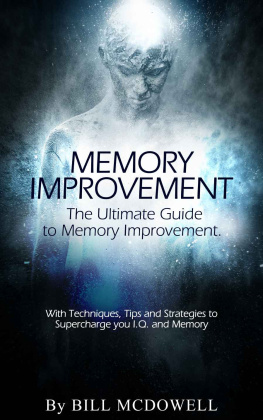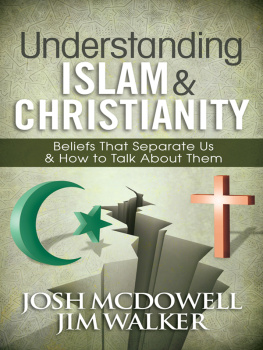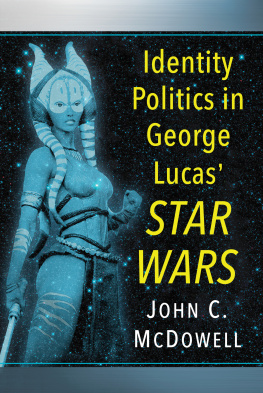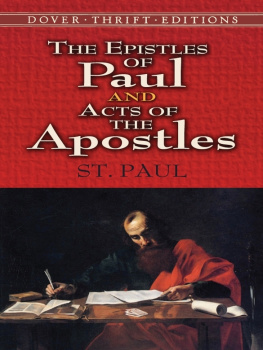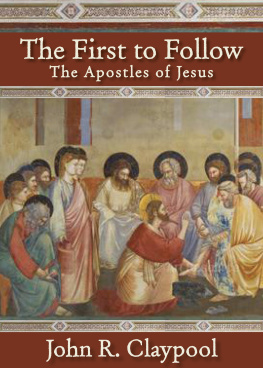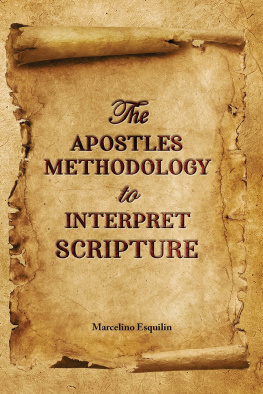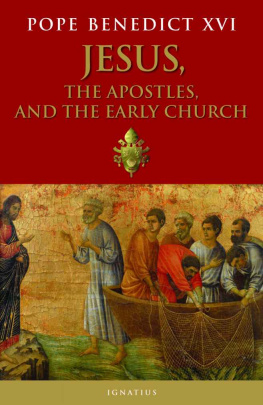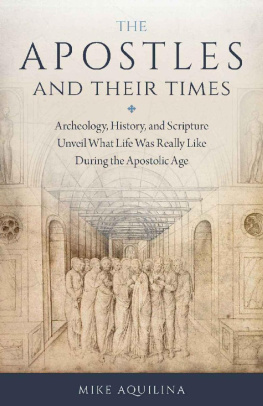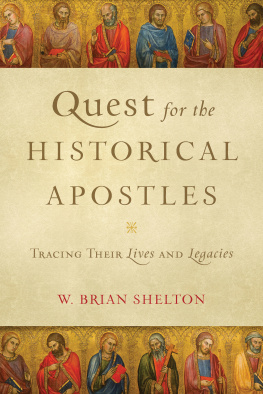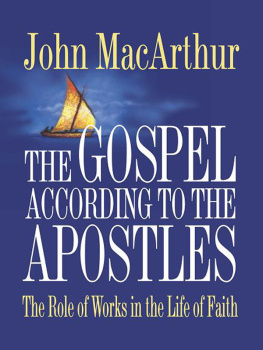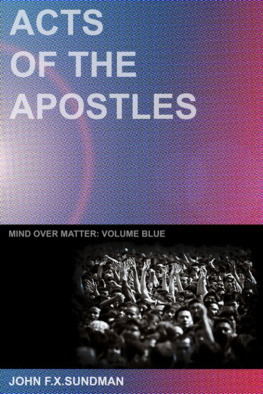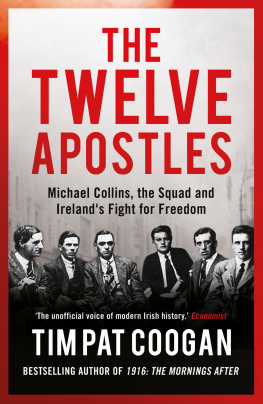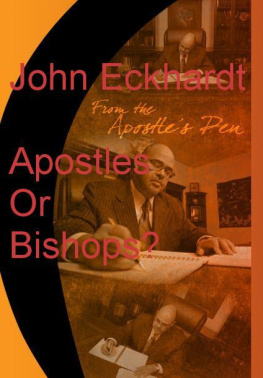THE FATE OF THE APOSTLES
The Book of Martyrs by John Foxe written in the 16th century has long been the go-to source for studying the lives and martyrdom of the apostles. Whilst other scholars have written individual treatments on the more prominent apostles such as Peter, Paul, John, and James, there is little published information on the other apostles.
In The Fate of the Apostles, Sean McDowell offers a comprehensive, reasoned, historical analysis of the fate of the twelve disciples of Jesus along with the apostles Paul, and James. McDowell assesses the evidence for each apostles martyrdom as well as determining its significance to the reliability of their testimony. The question of the fate of the apostles also gets to the heart of the reliability of the kerygma: did the apostles really believe Jesus appeared to them after his death, or did they fabricate the entire story? How reliable are the resurrection accounts? The willingness of the apostles to die for their faith is a popular argument in resurrection studies and McDowell offers insightful scholarly analysis of this argument to break new ground within the spheres of New Testament studies, Church History, and apologetics.
To my three kids: Scottie, Shauna, and Shane. My hope is that you will live
your lives with as much boldness and sacrifice as the apostles.
The Fate of the Apostles
Examining the Martyrdom Accounts of the Closest
Followers of Jesus
S EAN M C D OWELL
Biola University, USA

First published 2015 by Ashgate Publishing
Published 2016 by Routledge
2 Park Square, Milton Park, Abingdon, Oxon OX14 4RN
711 Third Avenue, New York, NY 10017, USA
Routledge is an imprint of the Taylor & Francis Group, an informa business
Copyright Sean McDowell 2015
Sean McDowell has asserted his right under the Copyright, Designs and Patents Act, 1988, to be identified as the author of this work.
All rights reserved. No part of this book may be reprinted or reproduced or utilised in any form or by any electronic, mechanical, or other means, now known or hereafter invented, including photocopying and recording, or in any information storage or retrieval system, without permission in writing from the publishers.
Notice:
Product or corporate names may be trademarks or registered trademarks, and are used only for identification and explanation without intent to infringe.
British Library Cataloguing in Publication Data
A catalogue record for this book is available from the British Library
The Library of Congress has cataloged the printed edition as follows:
McDowell, Sean.
The fate of the apostles : examining the martyrdom accounts of the closest followers of Jesus / by Sean McDowell.
pages cm
Includes index.
ISBN 978-1-4724-6520-7 (hardcover) ISBN 978-1-3155-5819-6 (ebook) ISBN 978-1-3170-3189-5 (epub) 1. ApostlesDeath. 2. Christian martyrsDeath. I. Title.
BS2440.M443 2015
272.10922dc23
2015009323
ISBN 9781472465207 (hbk)
ISBN 9781315558196 (ebk-PDF)
ISBN 9781317031895 (ebk-ePUB)
Acknowledgments
From beginning to end, my time researching and writing this project was possible only because of a team of generous supporters who surrounded and encouraged me. More than anyone else, my wife, Stephanie, gave me the strength to persevere when I was too tired and too frustrated to move forward, believing in me, encouraging me, reminding me I could do it. We did it, Love!
Tim and Kay Winn provided financial support through the Lampstand Foundation. I could not have done it without you. At different times, both Kim Van Vlear and John Nettleton have each provided unbelievable help so I could focus on this project.
Dr. Jim Parker was my doctoral advisor at Southern Baptist Theological Seminary, where I began the research that resulted in this book. Thanks for guiding me through and for making it enjoyable along the way! J. Warner Wallace helped me remain focused throughout the writing process and provided exceptional feedback. Thanks for all the phone calls where we discussed the nuances of the Stromata by Clement of Alexandria, the best way to calculate the martyrdom accounts for various disciples, and how to evaluate evidence. You are a colleague and a friend.
There are many other professors and friends who have been helpful along the way. Thanks to Andre Murillo, Dr. Victor Velazquez, and Dr. Alan Gomes for help with translation from German, French, and Latin sources. Dr. Thomas Schmidt responded to many of my email questions in relation to his research on the various apostles. And thanks to Dr. Ken Berding for guiding me through issues related to Polycarp and John, and for suggesting I connect with Dr. Charles E. Hill, who was incredibly helpful. I am indebted to Dr. Ted Cabal and Dr. Michael Haykin for providing positive feedback and direction. And thanks to Carlos Delgado and Chris Bosson for insightful criticism and amazing edits.
Dr. Michael Licona provided significant feedback throughout the entire process. Thanks for the various phone calls and constructive feedback. Youre a true friend.
Scott Lindsey and the team at Logos Bible Software made much of my research possible. I could not have done this without the incredible resources they made so easily available or the personal direction they provided.
I thank my colleague and friend, Dr. Craig Hazen, head of the MA Christian Apologetics program at Biola University. Craig hired me to begin teaching in the fall of 2014, before I finished my doctorate, even freeing me up significantly to commit to research and study. Thank you, Craig. I am honored to be part of the program, and forever grateful for the support.
Chapter 1
Introduction
How can we trust in the historical resurrection of Jesus? A commonly used argument points to the apostles willingness to become martyrs. Popular apologists frequently cite their deaths as good reason to trust the sincerity of their testimony, since it is difficult to believe they would go willingly to such gruesome deaths for the sake of empty deceit.
Credentialed scholars also make a similar argument. E.P. Sanders, for instance, in his The Historical Figure of Jesus, argues that many of the people in these lists [of eyewitnesses] were to spend the rest of their lives proclaiming that they had seen the risen Lord, and several of them would die for their cause.
And Michael R. Licona notes:
After Jesus death, the disciples endured persecution, and a number of them experienced martyrdom. The strength of their conviction indicates that they were not just claiming Jesus had appeared to them after rising from the dead. They really believed it. They willingly endangered themselves by publicly proclaiming the risen Christ.
Further, in The Historical Jesus of the Gospels, Craig S. Keener argues:
The disciples testimony was not fabricated. Ancients also recognized that the willingness of people to die for their convictions verified at least the sincerity of their motives, arguing against fabrication. People of course die regularly for values that are false; they do not, however, ordinarily die voluntarily for what they believe is false. Intentional deception by the disciples is thus implausible.
Still, despite the popularity and importance of this argument to historical Jesus studies, little scholarly work focuses primarily on evaluating the evidence for their martyrdoms.apostolic message: Were the apostles hopelessly biased? Did they really believe Jesus had appeared to them after his death, or did they fabricate the entire story? Do the deaths of the apostles provide positive evidence for the resurrection accounts? And perhaps most importantly, most fundamentally: How strong is the actual historical evidence that the apostles of Jesus died as martyrs? In offering this study, I hope to answer these questions.
Next page

![McDowell - God-Breathed]: the Undeniable Power and Reliability of Scripture](/uploads/posts/book/219249/thumbs/mcdowell-god-breathed-the-undeniable-power-and.jpg)
